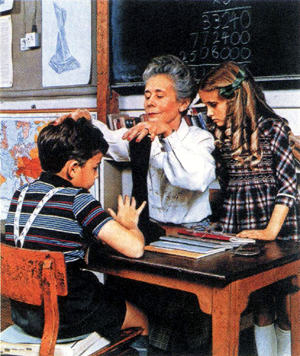|
Education schools need to drop the edu-babble |
|
Anyone who wishes to become a teacher in Canada must
hold a valid teaching certificate. In order to qualify, prospective
teachers must complete a Bachelor of Education (B.Ed.) degree from an
accredited faculty of education.
Since education schools hold a monopoly over teacher education, their
impact on the education of students in public schools is significant.
However, education schools have come under withering criticism from
their own graduates and are generally held in very low repute by
professors in other university faculties.
 Journalist Rita Kramer’s 1991 book, Ed School Follies: The
Miseducation of America’s Teachers, documents her experiences
visiting the campuses of 15 education schools. Kramer was dismayed at
the anti-intellectual attitude she found among most education students
and their professors. Education classes were often infantile places
where prospective teachers sang children’s songs, repeated stock
phrases, and shared their feelings. Journalist Rita Kramer’s 1991 book, Ed School Follies: The
Miseducation of America’s Teachers, documents her experiences
visiting the campuses of 15 education schools. Kramer was dismayed at
the anti-intellectual attitude she found among most education students
and their professors. Education classes were often infantile places
where prospective teachers sang children’s songs, repeated stock
phrases, and shared their feelings.
To see whether this is still true today, a graduate education student
provided me with a detailed set of notes about a standard education
foundations course recently completed in a faculty of education at a
Canadian university. If anything, these notes paint an even bleaker
picture than what Kramer found more than twenty years ago.
On the first day of this course, the professor made it clear that she
was going to be a "facilitator of learning" rather than a teacher of
specific content. The lack of tests or exams confirmed that students
would not need to know any specific facts or theories. During the
course, the professor regularly allowed discussions to deviate from the
topic, and she said this led to a deeper learning experience for
everyone. Unfortunately, the many digressions were all very shallow.
During one of her lectures, the professor displayed a slide that
featured a quote from a former education student. "I know now that I
don’t want to be the provider of knowledge but rather the facilitator of
experience." This reflects the standard view of education schools that a
teacher should be "a guide on the side rather than a sage on the stage."
|
|
“In order to
regain a modicum of credibility, universities need to be serious in
reviewing the courses and programs offered in their education schools.
They must ensure that these courses meet the academic standards of the
universities.” |
|
Incredibly, the naval gazing never relented as students regularly used
edu-babble to talk about the need to develop their authentic selves and
the authentic selves of students. They discussed the "multi-sensory"
nature of culture and devoted significant time to analyzing what nature
means to them. Even the distinction between "being subjective" and "subjectivity" was deemed worthy of class time. Any topic that involved
significant introspection always received top priority. No relevant
philosophical, historical, or sociological literature was referenced
even though there has obviously been significant scholarly work
conducted on all the topics.
Caucasian students in the course regularly made reference to their
unfortunate "white privilege." One student, for example, expressed her discomfort at being a member of a
social justice group as a white female since she did not have the same
experience with exclusion as some of the other group members. Many
references were made to the negative influence of Western, colonial
values in the readings and the discussions. Of course, this was assumed
rather than systematically examined.
During one outdoor session, students participated in a "shapeshifting" activity. Each person was told to walk toward an object they felt
"pulled" to and imitate it for 5 minutes. They were then
asked to come back to the group and
act out the object they saw. Spending several minutes pretending to be a
tree or a piece of grass might be appropriate for elementary school
students or perhaps students in a course on drama, but it is definitely
not graduate level course work in a professional program, at least in
the minds of serious students.
Many of the statements made during the course were nonsensical. Some of
the vacuous phrases expressed included:
- "Everyone's authenticity is different,"
- "There is a difference between being subjective and subjectivity,"
- "I am trying to foster an ambiguous sense of self rather than a
defined sense of self," and
- "We cannot remove ourselves from how we perceive ourselves."
Ironically, the professor and students seemed to
think many of these statements were actually quite profound. No one—not even the professor—seemed to be embarrassed by such trite expressions.
Courses such as this one are rampant in education schools. In order to
regain a modicum of credibility, universities need to be serious in
reviewing the courses and programs offered in their education schools.
They must ensure that these courses meet the academic standards of the
universities. Courses filled with meaningless edu-babble and simplistic
assignments need to be dropped and replaced with courses that will
challenge students to improve their understanding of teaching and
learning.
Until education schools are forced to get serious about cracking down on
the edu-babble and offer academically rigorous and respectable courses
and programs, they will continue to be held in low esteem by serious and
competent teachers, other university departments, and unfortunately by
the general public. |
|
 |
|
First written appearance of the
word 'liberty,' circa 2300 B.C. |
|
Le Québécois Libre
Promoting individual liberty, free markets and voluntary
cooperation since 1998.
|
|

